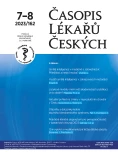-
Medical journals
- Career
Large language models are changing landscape of academic publications. A positive transformation?
Authors: Martin Májovský; Martin Černý; David Netuka
Authors‘ workplace: Neurochirurgická a neuroonkologická klinika 1. LF UK a ÚVN Praha
Published in: Čas. Lék. čes. 2023; 162: 294-297
Category: Review Article
Overview
The advent of large language models (LLMs) based on neural networks marks a significant shift in academic writing, particularly in medical sciences. These models, including OpenAI's GPT-4, Google's Bard, and Anthropic’s Claude, enable more efficient text processing through transformer architecture and attention mechanisms. LLMs can generate coherent texts that are indistinguishable from human-written content. In medicine, they can contribute to the automation of literature reviews, data extraction, and hypothesis formulation. However, ethical concerns arise regarding the quality and integrity of scientific publications and the risk of generating misleading content.
This article provides an overview of how LLMs are changing medical writing, the ethical dilemmas they bring, and the possibilities for detecting AI-generated text. It concludes with a focus on the potential future of LLMs in academic publishing and their impact on the medical community.
Keywords:
large language models (LLMs), neural networks, academic writing, artificial intelligence, transformer architecture, scientific research automation, publishing ethics, detection of AI-generated text
Sources
- Stokel-Walker C. ChatGPT listed as author on research papers: many scientists disapprove. Nature 2023; 613 (7945): 620–621.
- Editorial. Tools such as ChatGPT threaten transparent science; here are our ground rules for their use. Nature 2023; 613 : 612.
- Májovský M, Černý M, Kasal M et al. Artificial intelligence can generate fraudulent but authentic-looking scientific medical articles: Pandora’s box has been opened. J Med Internet Res 2023; 25: e46924.
- Májovský M, Černý M, Netuka D. Umělá inteligence při tvorbě odborného medicínského textu – dobrý sluha, ale zlý pán. Česká a slovenská neurologie a neurochirurgie 2023; 86 (3): 205–207.
- Gao CA, Howard FM, Markov NS et al. Comparing scientific abstracts generated by ChatGPT to real abstracts with detectors and blinded human reviewers. NPJ Digit Med 2023; 6 (1): 75.
- Dathathri S, Madotto A, Lan J et al. Plug and play language models: simple approach to controlled text generation. arXiv 2019 : 1912.02164.
- Else H, Van Noorden R. The fight against fake-paper factories that churn out sham science. Nature 2021; 591 (7851): 516–519.
- Májovský M, Mikolov T, Netuka D. AI is changing the landscape of academic writing: what can be done? Authors’ reply to: AI increases the pressure to overhaul the scientific peer review process. Comment on "artificial intelligence can generate fraudulent but authentic-looking scientific medical articles: Pandora's box has been opened". J Med Internet Res 2023; 25: e50844.
- Desaire H, Chua AE, Isom M et al. Distinguishing academic science writing from humans or ChatGPT with over 99% accuracy using off-the-shelf machine learning tools. Cell Rep Phys Sci 2023; 4 (6): 101426.
- Weber-Wulff D, Anohina-Naumeca A, Bjelobaba S et al. Testing of detection tools for AI-generated text. arXiv 2023 : 2306.15666.
- Pal S, Bhattacharya M, Lee SS, Chakraborty C. A domain-specific next-generation large language model (LLM) or ChatGPT is required for biomedical engineering and research. Ann Biomed Eng 2024 Mar; 52 (3): 451–454.
Labels
Addictology Allergology and clinical immunology Angiology Audiology Clinical biochemistry Dermatology & STDs Paediatric gastroenterology Paediatric surgery Paediatric cardiology Paediatric neurology Paediatric ENT Paediatric psychiatry Paediatric rheumatology Diabetology Pharmacy Vascular surgery Pain management Dental Hygienist
Article was published inJournal of Czech Physicians

-
All articles in this issue
- Úvodem
- Artificial intelligence in medicine and healthcare: Opportunity and/or threat
- Zogala D. Artificial intelligence in medical imaging
- Artificial intelligence’s contribution to early pulmonary lesion detection in chest X-rays: insights from two retrospective studies on a Czech population
- Artificial intelligence in diabetic retinopathy screening: from idea to a medical device in clinical practice
- Large language models are changing landscape of academic publications. A positive transformation?
- Trends in fertility and abortion in Czechia
- Changes in contraceptive behavior in Czechia
- Reproductive plan of women in Czechia in the context of late reproductive regime and the COVID-19 pandemic
- Infertility problems in the context of reproductive ageing
- The relation between age at menopause and age at first childbirth
- Questions and questionnaires about acute climacteric syndrome
- Practical clinical recommendations for perioperative care in bariatric surgery 2023
- Surgical and pharmacological treatment of childhood obesity
- František Adamík – the founder of otorhinolaryngology in the region of Moravian Wallachia and the ENT endoscopy pioneer
- Jmenování Jana Evangelisty Purkyně profesorem fyziologie ve Vratislavi
- PŘEDNÁŠKOVÉ VEČERY SPOLKU ČESKÝCH LÉKAŘŮ V PRAZE (DUBEN – ČERVEN 2024)
- Journal of Czech Physicians
- Journal archive
- Current issue
- Online only
- About the journal
Most read in this issue- Artificial intelligence in medicine and healthcare: Opportunity and/or threat
- Trends in fertility and abortion in Czechia
- Zogala D. Artificial intelligence in medical imaging
- Questions and questionnaires about acute climacteric syndrome
Login#ADS_BOTTOM_SCRIPTS#Forgotten passwordEnter the email address that you registered with. We will send you instructions on how to set a new password.
- Career

